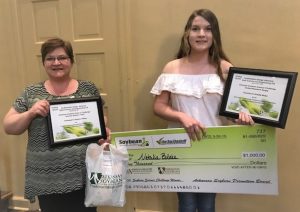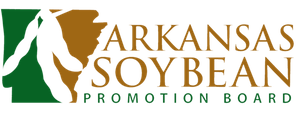Natalie Blake – 2019 Arkansas Soybean Science Challenge Award Winner State and Arkansas Regional Science & Engineering Fair

Natalie Blake, age 16, a junior at Star City High School in Star City, won the 2019 state Soybean Science Challenge at the Southwestern Energy Arkansas State Science and Engineering Fair at Central Arkansas University-Conway on March 30. Natalie also won the regional Soybean Science Challenge at the 2019 Southeast Arkansas Regional Science Fair at the University of Arkansas-Monticello on March 12.
Natalie Blake, Star City High School, Star City
Mentor: Shannon Blake
Category: Plant Sciences
Project Title: Differentiation in chloride absorption in Glycine max
Abstract:
Research Question: The research question for this project is “How will different soybean varieties differ in chloride absorption?”
Hypothesis: Of the tested soybeans, the wild Soja will have the least concentration in the leaves, thus having the least chloride absorbance, making them the most tolerant.
Procedure: The student began by planting eight pots of soybeans with two different varieties. They were grown in a greenhouse. The student watered all the pots with plain distilled water for nine weeks. The plants were harvested at this time by clipping the plant above the cotyledon. The samples were then mailed to the University of Arkansas. The samples were dried before our arrival. Once dried, the student ground the plants into a fine powder. One gram of plant material was weighed out and put into a tube with 15 ml of deionized water. The samples were then agitated for 20 minutes and strained. The strained solution was then put into the Inductively Coupled Plasma Optical Emission Spectrometer (ICPOES). Student samples were compared to known control solutions and produced readings of the accurate level of chloride found in the sample tissues.
Results: The Includers had slightly more free chloride contained in their tissues than the Excluders and Soja.
Conclusion: The results were consistent with the hypothesis but inclusive as older plants are needed Chloride is absorbed more when plants are older and have more leaves and petioles. Older, larger plants supply more material and samples.
Natalie Blake wins 2019 Arkansas Soybean Science Challenge Award at State and Arkansas Regional Science and Engineering Fair
Natalie Blake, age 16, a junior at Star City High School in Star City won the Soybean Science Challenge at the 2019 State Soybean Science Challenge award at the Southwestern Energy Arkansas State Science and Engineering Fair at Central Arkansas University in Conway, March 30. She also won the award at the Southeast Arkansas Regional Science Fair at the University of Arkansas-Monticello, March 12.
At the awards ceremonies, Blake received a $1,000 cash award at the state level and a $300 cash award at the regional level provided by the Arkansas Soybean Promotion Board. Her science project titled “Differentiation in chloride absorption in Glycine max” also received first place in Plant Sciences and was runner up for the overall ‘Best of Fair’ award at the regional level.
Shannon Blake, Natalie’s mentor, won the $200 Soybean Science Challenge Teacher Mentor award at both regional and the state level. Blake believes having students participate in the Soybean Science Challenge is a great idea. “My students learn about the sustainability of soybeans and the effects this crop has on Arkansas jobs and the economy. They get their hands dirty, and they open up connections with others who have the same interests which could be valuable to their futures,” she said.
Natalie says winning the regional and state Soybean Science Challenge is an honor and she was pleased to win. “There were many other excellent projects that were helpful as well, I was excited to see the level of competition and am thrilled to win this award,” she said.
Walt and Shannon Blake, Natalie’s parents, were very proud that Natalie won the state Soybean Science Challenge Award. “The competition was tough this year. We looked over a few of the boards and knew Natalie was going to have to be on her ‘A’ game,” they said.
Blake, Natalie’s mentor, discussed what Natalie gained by competing in the Soybean Science Challenge at the state level, “Natalie gained the experience of competing against advanced projects. With the large number of entries for The Challenge this year, she really had to know her project and be able to explain and justify it. This gave her the opportunity to really think about the value of her project, and this gave her the confidence she needed to participate at state,” she explained.
Natalie was also exposed to a different perspective about agriculture while working on her project. “I was able to have some new experience in a soil testing lab and I met some fascinating people who work with soybeans every day. I also had some experience dealing with seed viability and weed control while planting soybeans. I learned soybean seeds are delicate, and require constant temperature control. I also learned that choosing the best variety of seed for the soil and rain condition of an area can make a huge difference in soybean production,” she replied.
Natalie’s parents saw Natalie’s enthusiasm for agriculture grow as she worked through her project. “Natalie is enthusiastic about growing anything. She has been more excited towards agriculture as a career since learning all the areas under the title of ‘Agriculture’. Having worked on this project for two years now, Natalie has become serious about a career in Agriculture,” they said.
Blake believes there is a lot of relevance in teaching Agriculture in the classroom. Blake referenced the significance of a statement made by Challenge coordinator, Diedre Young, during the winner’s introduction at the state fair. Young said, “Agriculture is an area that reaches into any skill set. Whether a student chooses to be a farmer, an engineer, or a nutritionist, the Soybean Science Challenge is a launching pad for attaining basically any career goal.”
“The Soybean Science Challenge provides an opportunity for Arkansas High School students to participate in scientific research that can impact the State of Arkansas as well as the world. Soybean Science Challenge student researchers learn about this important commodity crop and its many uses including feeding the world, development of biofuels and sustainable products. The Soybean Science Challenge helps students develop an understanding of the challenges and complexities of modern farming,” said Dr. Julie Robinson, Assistant Professor and director of the program.
“The goal of the Arkansas Soybean Science Challenge is to engage students in “real world” education to support soybean production and agricultural sustainability,” said Gary Sitzer, a member of the Arkansas Soybean Promotion Board. “The program also rewards scientific inquiry and discovery that supports the Arkansas Soybean Industry.”
The Arkansas Soybean Science Challenge was launched in January 2014 to 9-12th grade science students. Students who successfully completed the online course were eligible to have their original soybean-related research projects judged at the 2019 ISEF-affiliated Arkansas Science and Engineering Fairs.
Information on the 2019-2020 Arkansas Soybean Science Challenge will be available in summer 2019. For more information, contact Dr. Julie Robinson at jrobinson@uaex.edu or Diedre Young at dyoung@uaex.edu.
The Cooperative Extension Service is part of the University of Arkansas System Division of Agriculture.
